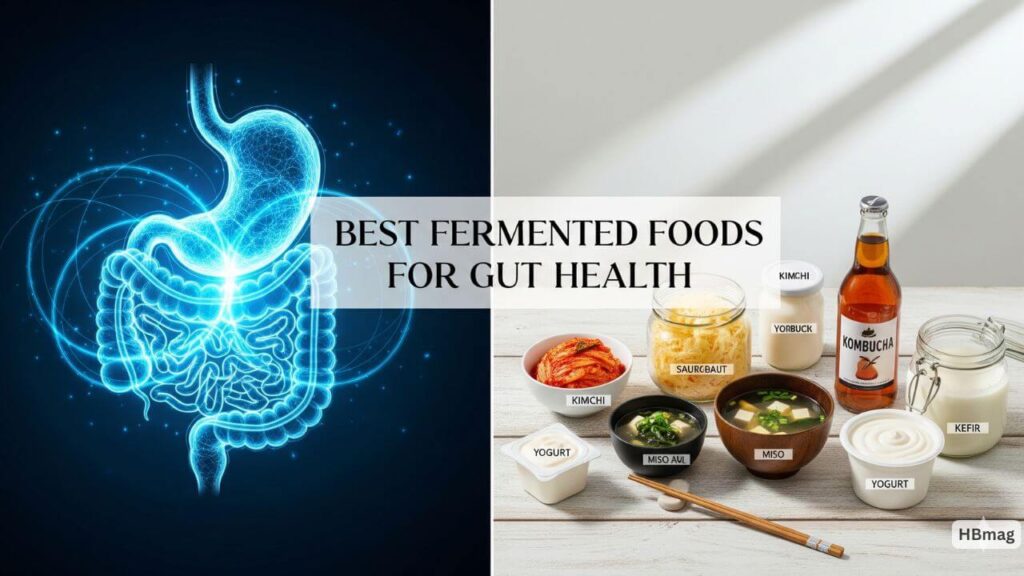Gut health is the hot topic of the wellness world. Doctors, nutritionists, and even celebrities are talking about how the gut affects not only digestion but also immunity, weight, and mental health.
At the centre of this conversation is the gut microbiome—a community of trillions of bacteria and other microbes living in your digestive tract. When this community is balanced, you feel energetic, digest food better, and even experience better moods. When it’s out of balance, problems like bloating, fatigue, or low immunity often follow.
One of the best and most natural ways to care for your gut is by eating fermented foods. These foods, rich in good bacteria, have been part of traditional diets for centuries. Today, science is proving why they’re so powerful for gut and overall health.
What Are Fermented Foods? A Simple Explanation
Fermentation is an ancient method of preserving food. It works by letting natural bacteria, yeast, or fungi break down sugars in food. This process produces helpful compounds like organic acids, vitamins, and probiotics (good bacteria).
Examples of fermented foods include yoghurt, sauerkraut, kimchi, and kombucha. These aren’t just tasty—they carry live microbes that can improve digestion, support the immune system, and even reduce inflammation.
The Gut Microbiome: Your Hidden Health Partner
Your gut is home to a massive ecosystem of microbes. Scientists estimate that the human body contains more microbial cells than human cells. Together, these tiny organisms form the gut microbiome.
Why It’s Important
- Digestion: Microbes help break down food that your stomach and intestines can’t digest on their own.
- Nutrient absorption: They produce vitamins like B12 and K2 and make minerals easier to absorb.
- Immunity: 70% of the immune system is in the gut. A healthy microbiome helps defend against infections.
- Brain health: Through the gut-brain connection, your microbiome influences mood and mental clarity.
When your gut microbiome is diverse and balanced, you feel well. But if it becomes unbalanced (dysbiosis), you may experience problems like digestive issues, frequent infections, or even low mood.
Fermented Foods vs. Probiotic Meds
Many people buy probiotic supplements, but fermented foods give you more.
- Diversity: Supplements have a few strains of bacteria. Fermented foods like kimchi or kefir have dozens.
- Synergy: Foods deliver probiotics with prebiotics (fibres that feed good bacteria), vitamins, and organic acids.
- Better absorption: Fermentation makes nutrients more bioavailable so your body can use them better.
Research shows people who eat fermented foods regularly have a more diverse gut microbiome than those who only take supplements.
Top Fermented Foods for Gut Health
Let’s get started.
1. Kimchi
A traditional Korean dish made from cabbage, garlic, ginger, and spices. Rich in probiotics, fiber, and antioxidants. Supports digestion and has anti-inflammatory effects.
2. Kefir
A tangy, drinkable yogurt made by fermenting milk with kefir grains. More probiotic strains than yogurt, and usually easier to digest for those with lactose intolerance.
3. Kombucha
A fizzy, slightly sour tea fermented with a SCOBY (symbiotic culture of bacteria and yeast). Probiotics and antioxidants. A popular soda alternative.
4. Sauerkraut
Finely shredded cabbage fermented by lactic acid bacteria. High in fiber, vitamin C, and probiotics. Choose raw, unpasteurized sauerkraut for live cultures.
5. Tempeh
A protein-rich food from Indonesia made with fermented soybeans. Improves nutrient absorption and is a great meat substitute.
6. Miso
A Japanese seasoning paste made from fermented soybeans. Adds flavor to soups and marinades. Probiotics, protein, and B vitamins.
7. Yogurt (unsweetened)
One of the most accessible probiotic foods. Look for varieties with “live and active cultures” on the label.
8. Pickles (fermented, not vinegar-based)
Naturally fermented pickles have probiotics for gut health. Make sure they’re not just preserved in vinegar, as that doesn’t have live bacteria.
Nutrients and Compounds Made During Fermentation
Fermentation doesn’t just preserve food—it creates new nutrients and bioactive compounds:* Short-chain fatty acids (SCFAs): Heal gut lining and reduce inflammation.
- Organic acids: Lower pH in the gut, making it harder for bad bacteria to grow.
- Extra vitamins: Fermented foods often have more B vitamins, vitamin K, and folate.
- Antioxidants: Fermentation can increase antioxidant activity and protect cells.
Drinks and Foods That Harm Gut Health
While some foods nourish the gut, others are worse for your gut. Limit or avoid:
- Sugary sodas: Feed bad microbes and inflammation.
- Excess alcohol: Disrupts microbial balance and irritates the gut lining.
- Artificial sweeteners: Some can alter gut bacteria.
- Highly processed foods: Lack fiber and contain additives that can harm gut health.
How to Add Fermented Foods to Your Diet
Beginner Tips
- Start small.
- Mix into meals you already eat.
- Choose raw, unpasteurized for the best probiotics.
Sample Daily Plan
- Breakfast: Kefir smoothie
- Lunch: Sauerkraut on a salad
- Dinner: Miso soup or tempeh stir-fry
- Snack: Kombucha or kimchi
Fermentation is Not New
Fermentation is part of food traditions worldwide.
- Korea: Kimchi with every meal.
- Japan: Miso and natto.
- Germany: Sauerkraut for centuries.
- Indonesia: Tempeh.
- Middle East & India: Yogurt and pickles.
This shows fermentation is more than a trend—it’s a global tradition with benefits.
Homemade Fermentation Worth It?
Making your own fermented foods can be easy and cost-effective. Homemade sauerkraut or kimchi often has more live cultures than store-bought.
But hygiene is key. Use clean jars and follow recipes to avoid spoilage. Beginners start with sauerkraut because it only requires cabbage, salt, and time.
Risks: Who Should Be Careful?
Fermented foods are safe for most, but some should be cautious:
- Weakened immune systems should consult a doctor before eating raw fermented foods.
- Histamine-sensitive sensitive may experience headaches or reactions.
- New to fermentation, start small to avoid gas or bloating.
Easy Recipes
Gut-Friendly Smoothie
- 1 cup kefir
- ½ banana
- 1 handful spinach
- ¼ cup berries
Blend and enjoy for breakfast.
Kimchi Fried Rice
- Cook rice, sauté veggies, stir in kimchi, season with soy sauce.
- Top with a fried egg for protein.
Conclusion: Small Steps, Big Benefits
Fermented foods aren’t just another wellness trend – they’re a proven way to improve gut health, boost immunity, and overall wellness. By adding even small amounts of kimchi, kefir, or sauerkraut to your meals, you’re nourishing your gut microbiome and taking a big step towards better health.
A healthy gut = a healthier, happier you.
FAQs
Are all fermented foods probiotic?
No. Beer, wine, and sourdough are fermented but don’t usually have live probiotics.
How much should I eat daily?
Start with 1-2 tablespoons and increase as your body adjusts.
Can kids eat fermented foods?
Yes, but introduce them gradually and choose milder options like yogurt.
Do probiotics survive cooking?
Heat can kill live bacteria, so add fermented foods like sauerkraut or miso after cooking whenever possible.


Recent Posts